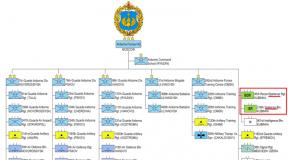Working as a credit specialist. How it all works: Loan specialist
The banking system in our country is rapidly growing and gaining momentum, so any specialties related to working in a financial institution are considered prestigious and in demand. After all, its profit and the level of customer confidence depend on the coordinated work of all bank employees. One of the important employees is credit specialists or experts, who are entrusted with the main task of a banking organization - issuing loans. However, let’s take a closer look at what a lending specialist should know, what qualities he should have, his job responsibilities and much more.
Job responsibilities of a credit department employee
The main responsibilities of a loan specialist are advising clients and selecting the best lending options for the borrower. That is, in fact, he performs several functions at once: he must attract the client, advise him on the lending services available to the bank, and choose the most suitable option that will best satisfy the client’s needs.
If the client is interested in the services of the bank, then the loan officer must calculate the maximum loan amount for him depending on his financial capabilities, calculate the loan term, the amount of the monthly payment and the annual interest rate.
Next, the loan specialist’s task is to fill out an application form and analyze the data, assess the borrower’s creditworthiness and the bank’s risks when collaborating with him. Yes, indeed, today the task of assessing solvency is performed by a scoring system, but a lot also depends on the credit specialist. After all, among other things, he must collect the borrower’s documents, visually assess their authenticity, then transfer them to the bank’s security service, credit committee and other departments of the financial institution that are responsible for issuing borrowed funds, while he must be attentive to the individual every client.
Working as a credit specialist requires the employee to have certain knowledge in order to perform the following functions:
- know the bank’s policies and principles for providing cash loans to private and corporate clients;
- have a good knowledge of the bank’s lending conditions in order to provide potential clients with the maximum amount of information and select the optimal terms of cooperation for each of them;
- be able to visually assess the authenticity of documents and the reliability of the interlocutor, in particular, his financial situation;
- how to make decisions correctly and bear financial responsibility for it.
Please note that one of the key tasks of a lending department employee is the ability to assess the client’s solvency, that is, in simple words, he must have some knowledge in the field of psychology in order to identify the borrower’s intentions to repay the borrowed funds during a conversation.
Personal qualities of a bank employee
Despite the fact that the bank takes a responsible approach to lending and primarily evaluates the professional skills of its employees, the personal qualities of employees play a big role. For a credit specialist, the main and personal qualities are communication skills, resistance to stress, responsibility and the ability to perform professional duties in strict accordance with the internal regulations of the bank.
In simple terms, a credit specialist must first of all be a reliable partner of a financial institution, and in any situation protect the interests of the bank. That is, he must not only bring a client and conclude a loan agreement with him, but at the same time do the same with reliable clients who will bring profit to the bank and repay the issued loan. By the way, it is worth saying that many banks pay their employees for special courses in psychology; this is primarily necessary so that the bank specialist can recognize at the stage of conversation with the client whether he will treat the circumstances responsibly or not.
Professional skills of a bank employee
You should not think that a loan officer should look for clients and bring them to the bank. No, this task is not his responsibility, but he must be able to properly advise the client and interest him in the bank’s services so that he draws up a loan agreement. Accordingly, the loan specialist must have a good knowledge of all the bank’s products and services; for this, of course, he must have at least a higher education.

Also, the loan specialist must be able to work with documentation, because he will be required to advise his clients on collecting the documents necessary for obtaining a loan. He must be able to visually assess their authenticity and in the future submit them for review to the bank's security service. By the way, the application for the issuance of credit funds is also filled out by a credit specialist, so he must know all the features of filling out these documents.
And finally, the final stage of the transaction is the signing of a loan agreement and the issuance of borrowed funds. Yes, by the way, the money is issued directly by the cashier, and this is not the responsibility of the loan specialist, but, nevertheless, he gives the loan agreement for signature and must, if necessary, answer all the borrower’s questions if they arise while reading the documents .
Important! All bank credit specialists undergo specialized training and education, because work in different financial institutions varies greatly, so management must provide its new employees with complete detailed and reliable information about working with bank documents.
How to get a job as a loan officer
In fact, finding a job as a loan officer is possible and it won’t be that difficult. After all, all bank employees have excellent career prospects, which means that the bank periodically recruits new employees for this position. The main requirement for an applicant is a resume; without it, it is almost impossible to get a job today. This means that the main task of job seekers is to correctly compose a resume for the employer.
What loan officer responsibilities should every potential applicant have on their resume? First of all, the applicant must know the specifics of the job, know the job responsibilities, that is, all the functions that he will need to perform at the new place of work. It is imperative to write in your resume whether you have experience in this position or not. In any case, the applicant’s task is to prove to the employer that he is familiar with the specifics of the job and knows the job responsibilities and cope with them accordingly.

You will also need to provide some information about yourself in the form:
- last name, first name, patronymic, date of birth, residential address;
- education: name of higher educational institution, faculty, specialty;
- work experience: here you must indicate previous places of work, length of work and reason for dismissal;
- describe what professional skills you have, exactly those that will be useful to the employer as a credit specialist;
- personal qualities of the applicant that will be useful directly for the position of a credit specialist.
Please note that a sample loan officer resume can be found and downloaded online. You can also see a sample of filling out the questionnaire, but it is worth considering that in this question you need to write only reliable information about yourself, because the bank takes a responsible approach to the election of employees.
So, the responsibilities of a credit consultant boil down to increasing the bank’s profits and attracting as many potential loan clients as possible. The profession is truly promising, because banking employees have excellent career prospects and high wages. And, by the way, credit specialists occupy not the last place in the banking structure. Therefore, when selecting employees, great attention is paid to the professional and personal skills of the applicant.
[Corporate logo of the credit institution]
[Name of the bank]
Appendix 9
to the Order on approval and introduction
into force of job descriptions
Department employees
lending
from ["__" _________ 20__]
№ [_____]
JOB DESCRIPTION
credit consultant
1.1. Position: credit consultant of the retail lending department (hereinafter referred to as the Credit Consultant).
1.2. A credit consultant is appointed to a position and dismissed by order of the [manager (position name)] of [the bank (its name is indicated)] (hereinafter referred to as the Bank).
1.3. The credit consultant submits to, reports to, receives orders and work instructions from the head of the personal lending department (hereinafter referred to as the Head of the Department), and in his absence, from the person performing his duties.
1.4. Labor relations between the Credit Consultant and the Bank are based on the legislation of the Russian Federation, internal regulations of the Bank and this job description.
1.5. The purpose of the position is initial interaction with clients when carrying out work on lending to individuals in order to increase the Bank's income, satisfy the economic interests of borrowers and increase the profitability of the Bank's activities.
1.6. The Bank provides the Credit Consultant with a workplace and a compensation package in accordance with the Personnel Regulations*.
*
Or with the terms of the employment contract, or another document.
1.7. Working hours: normal working hours.
2.1. The credit consultant performs the following functions:
2.1.1. Provides initial credit servicing to individual clients:
Accepts and reviews loan applications for loans from individuals;
Forms a package of documents for obtaining a loan;
Analyzes the creditworthiness of clients - individuals based on the documents provided;
Submits the borrower's documents for review by employees of supporting departments;
Draws up a conclusion on the feasibility of issuing a loan, lending conditions and forms of ensuring the repayment of issued loans.
2.1.2. Participates in work to study the bank lending market for individuals.
2.1.3. Consults clients - individuals on lending issues.
2.1.4. Keeps records of concluded loan agreements, collateral agreements and transactions carried out on them in accordance with the rules adopted by the Bank.
2.1.5. Studies legislation and modern technologies in the field of bank lending to individuals.
2.1.6. Develops and submits current reports on its activities to the head of the Department.
2.1.7. Carries out activities within the framework of combating money laundering and the financing of terrorism.
2.1.8. Makes proposals to the Head of the Department to improve existing and introduce new forms and methods of work.
2.1.9. Performs other duties within the scope of authority determined by the Bank’s internal documents and legislative acts.
2.2. When performing his functions, the Credit Consultant is obliged to:
2.2.1. Perform duties in accordance with the Bank's policies and procedures for the provision of banking services and the development of the Bank.
2.3. When performing his functions, the Credit Inspector has the right:
2.3.1. Conduct negotiations with clients on behalf of the Bank within the limits of their competence in accordance with this job description.
3.1.Required:
3.1.1. Secondary specialized (financial or accounting) education.
3.1.2. Knowledge of regulations, instructions and other governing documents of the Central Bank of the Russian Federation on lending issues.
3.1.3. Knowledge of the basics of tax legislation of the Russian Federation to the extent sufficient to carry out the assigned functions.
3.1.4. At least one year of experience working in a credit institution.
3.1.5. No criminal record.
3.1.6. Absence of facts of termination of the employment contract at the initiative of the employer in accordance with paragraph 7 of Article 81 of the Labor Code of the Russian Federation within one year preceding the day of appointment to the relevant position.
3.1.7. Ownership of a personal computer - MS Word and MS Excel package to the user's extent.
3.2. Desirable:
3.2.1. Possibility to work overtime.
3.2.2. Good learning ability.
3.2.3. Communication skills.
4.1. The credit consultant is responsible for the proper implementation of this job description, the instructions of the Head of the Department, the requirements of current legislation and internal regulations of the Bank regarding the implementation of the Bank's credit policy.
5.1. Upon appointment to a position, approval is required from the Head of the Department.
I have read this job description and I have received a copy:
(date of)
(signature)
(first name, patronymic, last name)
Along with other banking professions, the position of specialist is a separate link, since the bank is primarily a financial and credit enterprise. The skillful work of these people ensures the bank's solvency, increasing its loan portfolio, while at the same time improving the quality of service and reducing the level of debt.
Modern practice allows loan officers to also be called loan officers and examiners. Based on the name of the profession itself, you can obtain certain data. A loan officer is a bank employee
Knowledgeable and skillfully promoting the bank's policy in the field of providing funds as a loan;
Fluently navigates loan offers, looking for the most suitable products for borrowers;
Possessing a logical mind and ability to assess the solvency of a potential client;
Makes firm decisions and bears full responsibility for them.
In other words, a loan specialist must have a masterful understanding of all lending issues, from receiving an application to repaying the loan.
The credit specialist is obliged to:
Inform potential clients about current options for obtaining a loan and choose the most profitable one (these skills must be required, even if the bank has an active consultant);
Calculate loan amounts and monthly payments towards debt repayment;
Accept loan applications;
Monitor the client’s availability of all necessary documents;
Assess the risks of non-repayment of loans and assign the appropriate class/rating to the client;
Provide documents to the Security Service and the banking economic service;
Submit an application for consideration by the credit committee;
Draw up documentation (various contracts), payment schedules, applications for various purposes (for example, to write off an amount from wages or a plastic card to pay off a debt);
Sign contracts;
Support the contract and monitor timely debt payments. In particularly large companies, this is entrusted to a special department.
In addition, the credit expert in his work must be guided by some intuition and the skills of a social psychologist in order to determine the purity of the borrower’s intentions during just one preliminary conversation. To obtain the appropriate skills, employees of credit departments periodically undergo special psychological courses.
This is interesting: read our other articles -, and.
 Personal qualities of a loan specialist
Personal qualities of a loan specialist
Due to the nature of his job, a loan officer is forced to constantly communicate with clients. This obliges him to possess a number of such important personal qualities as communication skills, a desire to work with people, stress resistance, tact, responsibility and commitment to the principles of the bank.
The task of each loan specialist is not just to apply for a loan, but to enter into a strong relationship with a reliable client, satisfying his needs, while simultaneously providing the bank with a return of funds and generating income. In order to more competently understand their environment and quickly provide assistance to borrowers, specialists are often divided by type of lending. Thus, some specialize in mortgage programs and similar products, others in consumer loans, etc. A narrow profile allows a specialist to delve deeper into the intricacies of the selected product and apply knowledge in practice.
Currently, the services of credit specialists are in great demand and it is no accident that banks place high demands on the quality of work and diligence of their employees. For the borrower, the specialist is a kind of face of the entire bank. For the bank itself, it is one of the main connecting links of the entire mechanism. And the main thing is that this link is strong. Otherwise, the stability of the bank will be disrupted, which will not lead to anything good.
We also want to draw your attention to completely new professions in the banking sector - and.
Job advertisements are now simply full of vacancies for “loan specialist”. What will the job consist of, and what knowledge and skills should the applicant have? The answer to this question is of interest not only to job seekers.
Loan specialist job
As soon as these workers are not called: credit consultants, inspectors, managers, experts. But the essence is still the same - an employee of a financial and credit institution promoting the bank’s line of credit products to the masses.
Since any bank earns its main income through lending, specialists at this level are always in demand. So to speak, these are the main breadwinners of the bank. After all, it is they who ensure the receipt of that very profit, which subsequently goes to pay the wages of all staff.
But any loan should not just be given to the first person who wants it. It is important to do this as efficiently as possible so that in the future this potential income does not “fall out” into overdue debts and does not disrupt the stable operation of the bank. That is why high demands are placed on credit specialists in any serious bank.
The exception is MFOs, where such employees can be hired without work experience and more or less decent education. Such organizations hire consultants who represent their credit institution in stores, shopping centers, etc., and teach them the basics of the profession independently.
Responsibilities of a loan officer
Initially, a bank loan officer is assigned the role of a consultant. He must be able to inform the potential borrower as thoroughly as possible about the loan programs available at the bank and advise on the option that will satisfy all the client’s requirements. In large banking institutions, all credit specialists are divided into groups, and each deals with a separate area. One, for example, works exclusively with car loans, the second with consumer loans, the third with mortgages, etc. This gradation allows managers to study all the intricacies of “their” area and become as competent as possible in it.
During the consultation process, the expert must:
- calculate the loan amount that the client can receive (the calculation is made based on the latter’s solvency);
- calculate the amount of monthly payments based on the proposed loan terms;
- draw up a preliminary repayment schedule and familiarize the potential borrower with it;
- calculate the amount of the insurance premium if the client participates in the insurance program.
When all the main points have been announced, and the potential borrower decides on the issue of lending in a positive way, the loan officer fills out an application and accepts a package of documents. At this stage, the specialist’s responsibilities include:
- acceptance of the application itself, and, if necessary, assistance in filling it out;
- checking the passport photo with the applicant’s identity;
- checking all submitted documents for correctness.
In addition, the credit manager evaluates the appearance and accessories of the client and his accompanying persons (if any). This approach in most cases reduces the bank’s risks regarding loan repayment. The financial structure does not need unnecessary problems, so they assign rating marks to clients based on visual assessment. Well, you must agree that it is dangerous to give a loan if the borrower has a certain friend “over his soul” and tells him how to write and how much to take.
After accepting the application, the loan specialist submits all documentation for review to the bank’s security service, and in exceptional cases (for a mortgage, for example) to lawyers. At the same time, he is preparing his opinion on the planned transaction. If the decision of all services is positive, the manager submits the project for consideration (or to the credit commission) of the bank.
- preparation of all necessary documentation to complete the transaction;
- ensuring the process of signing a loan agreement;
- support of the transaction until the repayment of all loan obligations of the borrower to the bank.
Support here means control over the timely payment of the loan and related payments (commissions, fees, insurance premiums, etc.). When the first case of late payment occurs, the credit specialist is obliged to inform the borrower about the existence of a delay and take the necessary measures to repay it as quickly as possible.
Qualities and skills of experts
Any serious institution wants to see a specialist with experience in the field of finance, but in some cases it is possible to fill a vacancy without experience, but with a higher education in the financial field. In addition, applicants are subject to the following set of requirements:
- literacy;
- tact;
- the ability to think logically and evaluate a potential client;
- fast learner;
- emotional stability in unusual situations;
- communication skills;
- neat appearance.
A candidate for the position of a credit specialist should also be a bit of a psychologist. After all, almost any client needs to be able to persuade them to take out a loan, and in case of delay, convince them to repay it and no longer miss scheduled payments.
Already working in a bank in the desired position, you need to thoroughly study the bank’s lending policy and have a good understanding of the loan products promoted by this financial institution. Otherwise, you may not complete the probationary period and say goodbye to your position.
Cons of the profession
One of the disadvantages is the bonus system of remuneration, which is now practiced in the banking sector. Credit inspectors are paid a small salary, and the bulk of their earnings are incentives for good performance. So you have to work hard to earn a decent amount.
Specialists working in large banks consider the main disadvantage of their position to be the responsibility for supporting credit projects. It's good when everything goes smoothly. What if clients suddenly stop paying? In addition to the main responsibilities of attracting and lending, one has to spend titanic efforts to repay overdue debts. These are constant calls, negotiations, persuasion...
But you will waste the very time that could be spent usefully for your wallet, attracting new clients. Moreover, in most cases, delays have a negative impact on operating results and affect the amount of the accrued bonus.
The loan officer does not always work with the incoming flow of citizens. In most cases, he can sit on the phone all day or go through presentations in order to attract at least one client for lending. Those who dream of working in an office are unlikely to like this. And if you get a job as a manager in an MFO, then you can work not within the walls of a credit institution, but at a remote location. Large shopping centers are simply crammed with such specialists from different structures. Can you imagine what kind of competition this is? It is almost impossible to earn bonuses here, so you will have to be content with a meager salary, which will be the only component of your earnings.
But the main disadvantage is sales plans. The amount of bonuses and bonuses depends on their implementation. Moreover, the plan can be set not only by the number of loans issued, but also by the amount of funds issued and the percentage of borrowers attracted to insurance programs. It’s good if you work in a big city and have a constant flow of clients. In small towns, there always comes that very moment when most of the population finds themselves in debt and there is simply no one to offer their products.
This is what it is, the profession of a credit specialist. Let's be honest, it's not sugar. But with some effort, you can make good money from all kinds of bonuses and incentive payments. But it’s not always possible to achieve decent results. And for successful work and good earnings, we have to drive our already not rich population into even greater debts and push them to. What to do, you have to accept it as it is.
Lending is one of the most popular services provided by banks. Financial institutions offer similar services to the population to meet various needs: from household appliances to living space. Today it is impossible to imagine our life without the possibility of lending. After all, it is precisely this that allows you to carry out your plans even in the absence of money, be it opening your own business or buying a car.
What is lending
With the help of loans, it has become much easier to organize and distribute funds. Lending is provided by commercial banks and financial institutions. For each type of debt obligation, there are certain conditions, which include the amount of the minimum down payment, the loan repayment interest, as well as the individual characteristics that the borrower must have. For each amount of money issued, the bank sets certain requirements for the client that he must meet.
The loan is issued not only to legal entities and individuals; the borrower can also be another commercial bank.
Requirements for the qualities of a loan specialist
The success and productivity of a bank directly depend on the qualifications of its employees. Since the main income of the bank is considered to be the expansion of resources, staff need to make every effort to ensure that the operation is profitable.

One of the most important officials of a bank is a specialist in the credit department. His responsibilities are to provide complete information to the client about the loan. He also prepares and submits to the bank commission all the documents necessary for registration.
A credit specialist, whose responsibilities include directly advising the client and concluding an agreement with him, must have not only a number of professional skills, but also many human qualities, such as:
- Honesty.
- A desire to work.
- Ability to think logically.
- Ability to intuitively identify potential clients.
- Responsibility.
- Stress resistance.
- Ability to find a common language with each client.
- Communication skills.
- Competence.
Functions
A credit specialist, whose responsibilities are radically different from the functions of managers and inspectors, does not search for clients, but enters into an agreement and maintains the loan until its closure with existing clients. To make the bank more profitable, the search for potential clients among legal entities and individuals is carried out by a special department.

The responsibilities of a loan officer at a bank include:
- Informing potential clients about tariffs.
- Providing complete information about the conditions for obtaining a loan.
- Assistance in choosing a loan.
- Calculation of basic loan indicators, such as terms, interest, minimum payment and payment schedule.
- Acceptance of applications for extradition.
- Checking the package of documents provided by the borrower.
- Carrying out credit risk assessment.
- Preparation of necessary papers and documents.
- Control of the process of issuing funds.
- Transaction support until the loan is fully repaid.
A credit officer, whose responsibilities include all of the above points, must also have a sufficient level of self-control, which may be needed in unforeseen situations.
Training of specialists
People who have graduated from the Faculty of Finance or Economics have the opportunity to work in this banking industry. Many banking institutions only hire employees with a higher education diploma for this position.

The job responsibilities of a loan officer involve constant communication between the bank employee and the borrower.
Training and retraining of professionals in this field is carried out directly by the financial institution itself. For better quality work, many banks divide loan specialists into subgroups. That is, each employee is assigned a separate category of goods in which he specializes. Some work exclusively with consumer loans for goods and services, while others deal only with car loans. Specialists in issuing and supporting mortgages should also be highlighted separately.
The division of specialists by type of lending is carried out in order to improve the quality of their work. After all, each of them must have not only general concepts relating to this area, but also thoroughly master the regulatory aspects.
Work specifics
The credit specialist, whose responsibilities also include conducting the transaction, must, if necessary, collect and prepare all the necessary documents for issuing any type of loan. The main document is the loan agreement, which is filled out by the borrower and the banking institution.

The document stipulates such points as:
- Borrower's agreement to repay funds.
- The amount made available.
- Penalties provided for violation of the rules of the contract.
The decision to issue a loan is made directly by the bank commission; the specialist only submits all the necessary documents. After approval, the expert will support the transaction until the loan is fully repaid.
Resume for applying for a job
The work of a specialist in this industry is worthy of respect. After all, constant contact with people and communication with them require not only professional skills from an expert. This profession is considered very prestigious. It provides an opportunity for personal and career growth. Let's list the main skills and responsibilities of a loan officer for a resume.
In order to obtain a position as a credit specialist, your resume should include the following information:
- Personal Information.
- Previous employment.
- The level of education.
- Types of lending that the specialist is familiar with.
- Work experience.
- Benefits of the job.
- Level of knowledge of foreign languages.
- Professional skills.
- Personal qualities that can improve the work process.
The bank's performance directly depends on the professional qualities and skills of its staff. Credit specialists occupy not the last place in this chain and are able to influence the success of the bank as a whole.




















